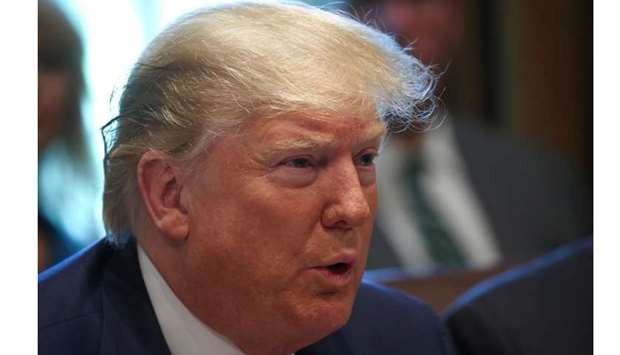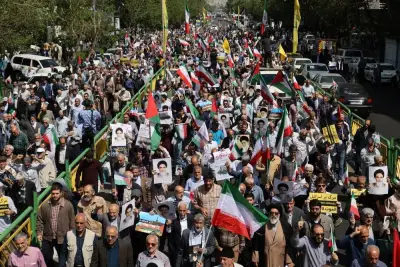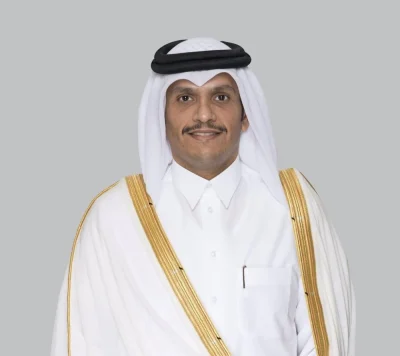*Tehran says missile programme under no condition negotiable
US President Donald Trump said Tuesday "a lot of progress" had been made towards ending a volatile stand-off with Iran, with his top diplomat saying Tehran had signalled willingness to negotiate over its disputed ballistic missile programme.
But Iran denied that it was willing to negotiate over its ballistic missile programme, contradicting the chief US diplomat and appearing to undercut President Donald Trump's statement.
Secretary of State Mike Pompeo said Iran had signaled it was ready to negotiate about its ballistic missiles during a White House Cabinet meeting at which Trump said: "We'll see what happens. But a lot of progress has been made."
Pompeo appeared to be reacting to a comment by Iran's foreign minister that Tehran would discuss its missile programme after Washington stopped arming allies the United Arab Emirates and Saudi Arabia, something the United States is unlikely to do.
His assessment drew a quick denial from the spokesman for Iran's mission to the United Nations, who posted on Twitter: "Iran's missiles ... are absolutely and under no condition negotiable with anyone or any country, period."
The exchanges came hours after Iran's supreme leader upped the ante in the brewing confrontation by warning Tehran would continue removing restraints on its nuclear activity and retaliate for the seizure of an Iranian oil tanker.
Tensions have spiraled since Trump last year ditched big powers' 2015 nuclear deal with Iran under which it agreed to curtail its nuclear programme in return for the lifting of global sanctions crippling its economy.
Washington has since reimposed draconian sanctions to throttle Iran's oil trade in a policy of "maximum pressure" on Tehran to agree stricter limits on its nuclear capacity, curb its ballistic missile programme and end support for proxy forces in the Middle East.
After the threats from Ayatollah Ali Khamenei, Iran's ultimate authority, Trump struck a conciliatory note, saying the United States wanted to help Tehran.
"We'll be good to them, we'll work with them. We'll help them in any way we can, but they can't have a nuclear weapon. We're not looking, by the way, for regime change," Trump told the Cabinet meeting.
"They (also) can't be testing ballistic missiles."
Pompeo told the Cabinet meeting Iran had "for the first time" signaled it was prepared to negotiate about its ballistic missiles, suggesting this was the result of US economic pressure.
Iranian Foreign Minister Mohammad Javad Zarif told NBC's "Nightly News with Lester Holt" programme that once the Trump administration removed sanctions it has restored since leaving the nuclear deal the "room for negotiation is wide open."
Asked if that could include its ballistic missile programme, Zarif replied: "If they want to talk about our missiles, they need, first, to stop selling all these weapons, including missiles, to our region."
The Islamic Republic has repeatedly ruled out negotiating under sanctions duress from Washington. It has long said its ballistic missile programme is defensive and non-negotiable.
Fears of direct US-Iranian conflict have risen since May with several attacks on oil tankers in the Gulf, Iran's downing of a US surveillance drone, and a plan for US air strikes on Iran last month that Trump called off at the last minute.
In a strategy meeting on Monday, European parties to the nuclear deal decided not to trigger its dispute mechanism over Iran's breaches in favour of pursuing more troubleshooting diplomacy.
But they took no action to shield Iran against Trump's sanctions clampdown as Tehran has demanded in exchange for returning to full compliance with the 2015 deal.
Supreme leader Khamenei accused Britain, Germany and France of failing to uphold obligations under the deal to restore Iranian access to global trade, especially for Tehran's oil exports blocked by US sanctions.
"According to our foreign minister, Europe made 11 commitments, none of which they abided by. We abided by our commitments and even beyond them. Now that we've begun to reduce our commitments, they oppose it. How insolent! You didn't abide by your commitments!" Khamenei said, according to his website.
"We have started to reduce our commitments and this trend shall continue," Khamenei said in remarks carried by state television.
Secretary of State Mike Pompeo said Iran had signaled it was ready to negotiate about its ballistic missiles during a White House Cabinet meeting at which Trump said: "We'll see what happens. But a lot of progress has been made."
Pompeo appeared to be reacting to a comment by Iran's foreign minister that Tehran would discuss its missile programme after Washington stopped arming allies the United Arab Emirates and Saudi Arabia, something the United States is unlikely to do.
His assessment drew a quick denial from the spokesman for Iran's mission to the United Nations, who posted on Twitter: "Iran's missiles ... are absolutely and under no condition negotiable with anyone or any country, period."
The exchanges came hours after Iran's supreme leader upped the ante in the brewing confrontation by warning Tehran would continue removing restraints on its nuclear activity and retaliate for the seizure of an Iranian oil tanker.
Tensions have spiraled since Trump last year ditched big powers' 2015 nuclear deal with Iran under which it agreed to curtail its nuclear programme in return for the lifting of global sanctions crippling its economy.
Washington has since reimposed draconian sanctions to throttle Iran's oil trade in a policy of "maximum pressure" on Tehran to agree stricter limits on its nuclear capacity, curb its ballistic missile programme and end support for proxy forces in the Middle East.
After the threats from Ayatollah Ali Khamenei, Iran's ultimate authority, Trump struck a conciliatory note, saying the United States wanted to help Tehran.
"We'll be good to them, we'll work with them. We'll help them in any way we can, but they can't have a nuclear weapon. We're not looking, by the way, for regime change," Trump told the Cabinet meeting.
"They (also) can't be testing ballistic missiles."
Pompeo told the Cabinet meeting Iran had "for the first time" signaled it was prepared to negotiate about its ballistic missiles, suggesting this was the result of US economic pressure.
Iranian Foreign Minister Mohammad Javad Zarif told NBC's "Nightly News with Lester Holt" programme that once the Trump administration removed sanctions it has restored since leaving the nuclear deal the "room for negotiation is wide open."
Asked if that could include its ballistic missile programme, Zarif replied: "If they want to talk about our missiles, they need, first, to stop selling all these weapons, including missiles, to our region."
The Islamic Republic has repeatedly ruled out negotiating under sanctions duress from Washington. It has long said its ballistic missile programme is defensive and non-negotiable.
Fears of direct US-Iranian conflict have risen since May with several attacks on oil tankers in the Gulf, Iran's downing of a US surveillance drone, and a plan for US air strikes on Iran last month that Trump called off at the last minute.
In a strategy meeting on Monday, European parties to the nuclear deal decided not to trigger its dispute mechanism over Iran's breaches in favour of pursuing more troubleshooting diplomacy.
But they took no action to shield Iran against Trump's sanctions clampdown as Tehran has demanded in exchange for returning to full compliance with the 2015 deal.
Supreme leader Khamenei accused Britain, Germany and France of failing to uphold obligations under the deal to restore Iranian access to global trade, especially for Tehran's oil exports blocked by US sanctions.
"According to our foreign minister, Europe made 11 commitments, none of which they abided by. We abided by our commitments and even beyond them. Now that we've begun to reduce our commitments, they oppose it. How insolent! You didn't abide by your commitments!" Khamenei said, according to his website.
"We have started to reduce our commitments and this trend shall continue," Khamenei said in remarks carried by state television.



